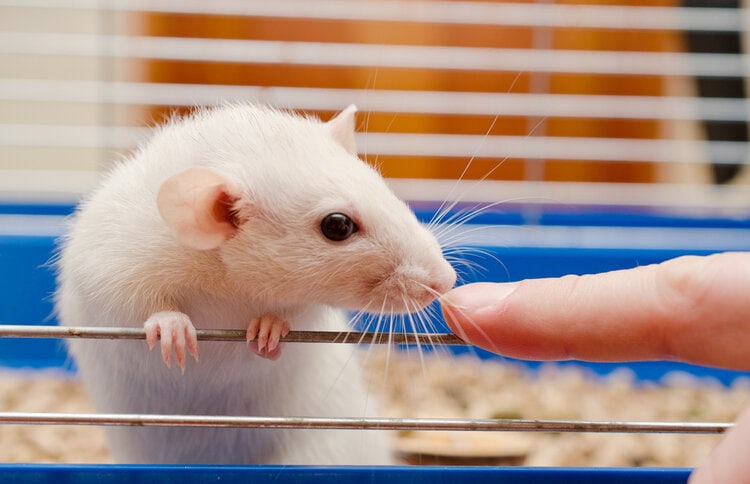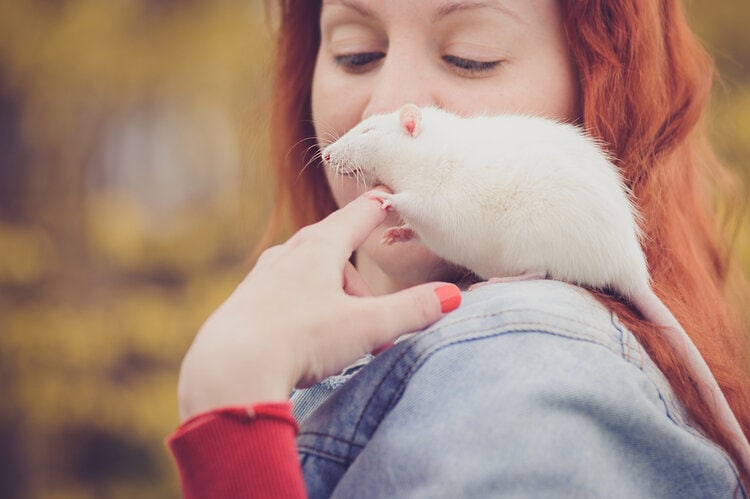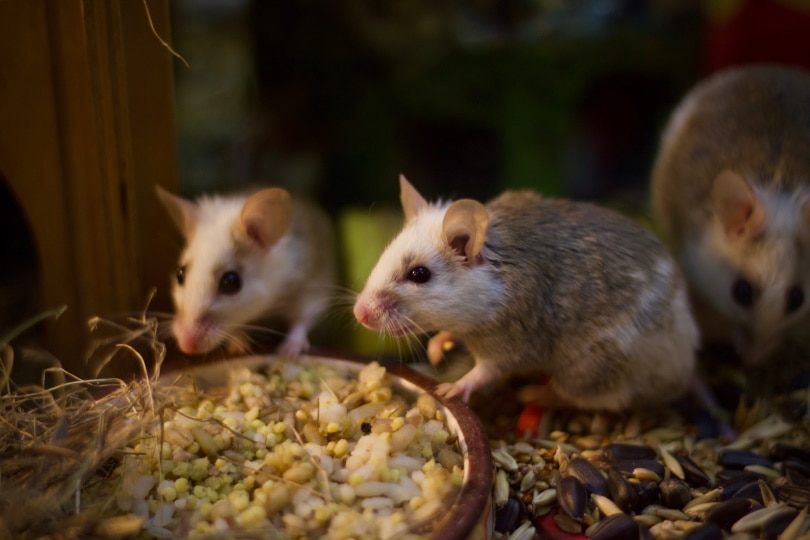
Click to Skip Ahead
Some people might snub their noses when they see an adorable rat running across your floor. Blame the connection with the plague or underground sewers—rats make lots of folks uneasy. But if you’ve ever spent more than a few minutes around rats, you quickly understand just how amazing these critters truly are.
Rats are even-tempered, affectionate, and intensely smart. If you’ve seen the curly fur of a rex rat, you might wonder what you can find out about these cuties—and you made the right stop. Let’s go over all the fascinating aspects of rex rat-owning.
Quick Facts About Rex Rats
| Species Name: | Rattus norvegicus |
| Family: | Muridae |
| Care Level: | Easy |
| Temperature: | 65-72 degrees Fahrenheit |
| Temperament: | Docile, curious, affectionate, intelligent |
| Color Form: | Albino, blue, black, cream, platinum, buff, silver, sable, Siamese, fawn, gray |
| Lifespan: | 2-3 years |
| Size: | 9-11 inches, 1-2 pounds |
| Diet: | Omnivore |
| Minimum Cage Size: | 2 cubic feet per rat |
| Cage Set-Up: | Multi-level |
| Compatibility: | Very compatible |
Rex Rats Overview
Rats might be one of the most overlooked and underappreciated domesticated species around. Many people fear rats due to misconceptions about these cool critters. Minds usually change pretty quickly after meeting one, though—since most rats are so charismatic.
People are usually impressed right off the rip with the intuitiveness and alertness pet rats possess. They’ve come a long way from household pests, proving themselves worthy of love and attention.
Rex rats will impress you with their desire to learn, even things you don’t want them to. They can be destructive if left alone, so always monitor playtime. For whatever reason, rats seem to be drawn to cords, cloth, and basically anything you don’t want them to have. You need to watch them closely while they’re out to make sure they don’t get into too much mischief.
With the proper environment and interaction, rex rats will thrive happily in your home.

How Much Do Rex Rat Cost?
Thankfully, even specialty rat breeds don’t cost a ton. Sometimes, it depends on the rarity of color or pattern when breeders determine the price.
On average, a rex rat costs between $20 to $50 if you adopt them from a breeder. Some breeders will give you a discount if you adopt multiples—and some won’t let you buy from them unless you get a pair.
You might be able to find a surrendered or bonded rat pair for rehoming. If you do, you can expect supplies to come with it, so this can be a huge expensive relief.
Typical Behavior & Temperament
Rex rats are incredibly social, friendly, and inquisitive. They make strong bonds with people, rats, and even other species sometimes. It’s not unusual for a rat to remember its name and the sound of its owner’s voice.
Rats are one of the most brilliant creatures that exist—landing somewhere in the most intelligent species on the planet. Rats can easily learn commands, master mazes, and rock all sorts of tricks.
Rex rats are surprisingly clean animals—always grooming one another. They can even learn to use a litterbox instead of going to the bathroom everywhere in their cage. If you start training them early, it can make cage clean-up a lot less of a hassle.
All rats have extremely high empathy, mirroring the way human brains are constructed. They share so many qualities, which is probably why bonding with your rat will be so easy. Once you gain their trust, you have a lifetime of loyalty.
Because rex rats are so gentle, they make very good first pets. While it may make some parents cringe, rats are less likely to bite than more popular critters like hamsters or guinea pigs. They also tend to be less skittish and more physically affectionate.
Rex rats shouldn’t be left alone for long periods. Even in their social groups, they thrive on attention. You need to get your rat out to play as much as you can. The more time they spend with you, the closer you’ll be.

Appearance & Varieties
The rex mutation exists in rats, cats, guinea pigs, and rabbits. Genetically, it produces a curly or wavy coat, making way for some interesting coat possibilities. Rex rats can come in virtually any coat color and pattern. Let’s take a look at the possibilities.
You can enjoy the rex variation in any of these patterns and colors, so they’re very versatile.
How to Take Care of Rex Rats
Rats are surprisingly easy to care for. As long as you have the right-sized cage, provide adequate nutrition, and keep their living space sanitary—you have the bulk of care covered.
Of course, rats require social stimulation, too. So, always make sure they have a friend and get lots of playtime outside the cage.
Habitat, Conditions & Setup
Cage Requirements
Rats should always come in pairs—and your space needs to be suitable for them both. For two fully grown rats, your cage should be at least 29” x 15” x 18”. The bars need to be no more than half an inch apart.
Rats do best in a multi-level cage so they can climb and explore. Make sure your cage is free of any sharp edges or large openings. Your rats will be master escape artists, so you might be surprised what they can squeeze through.
Bedding
When it comes to bedding, you have a few different options—so you can find out which one works best for you.
- Tip: Never buy cedar or pine bedding for your rat. Phenols in these wood chip choices affect the liver in rats and other small rodents.
Accessories
Your rex rats will absolutely love having activities around their cage to keep their attention. They love playing with each other and new, fun objects. Rats love spending time nestled together, too.
Outside of the cage, you can buy them exciting floor toys to make exploring fun.
- Tip: Plastic mouse balls are too small for rats. You can possibly find a ball in a bigger size, but traditionally—they can’t move in an enclosed ball very naturally, which can stress out your rat.

Do Rex Rats Get Along With Other Pets?
It may surprise you to know that rats get along amazingly well with other pets. Now, of course, there are some concerns when you mix different species—so always err on the side of caution. You should always supervise any interactions between rats and other species.
Rats can make friends with the household cat or dog, but that doesn’t mean you should trust the situation. One wrong move and things could go very wrong. Rats are very small in comparison. And no matter how curious they are, they couldn’t defend themselves against much bigger animals.
But when it comes to rats being the bigger guy in the brawl, they might try to bully other rodents. They do have a prey drive, too. So, they wouldn’t be compatible with mice, gerbils, or hamsters. Never buy a rat to keep in a cage with another species—that’s a recipe for fighting and worse.
It’s completely necessary to own more than one rat at a time. You should have a pair at the very least, but they can thrive in larger communities. These creatures are highly social, loving, and caring for their cage mates.
Solitary rats can get very lonely and depressed. Even if you think that your attention is enough to keep your rat company, they truly need their own kind, too. Don’t wait to introduce an adult rat to a baby rat, since they can seriously injure the younger rat.
If you can buy a bonded pair, this is the ticket. If you buy separately, introduce slowly.
What to Feed Your Rex Rats
Rex rats are omnivores, so they eat both plants and meat. Thankfully, there are premade well-balanced diet cubes in all main pet stores and online. These cubes contain all of the vital nutrients your rat needs to stay healthy.
Most commercial food covers nutritional basics but adding in fresh food is even better.
Like any other animals, some food can be dangerous to our rodent buddies.
Always make sure your rat has a fresh water source available to them.
Keeping Your Rex Rat Healthy
Unfortunately, rats have very short lifespans. The longest they are projected to live as pets is 2 to 3 years. Don’t let the short lifespan deter you from owning one of these glorious little creatures.
For your rex rat to live as long as possible, you have to make sure the environment is right. They benefit from multi-level cages where air can freely move, but don’t set the cage too close to any drafty doors or air vents.
Some major health concerns for rex rats are:
Unless your rat has an immediate health concern, you might not consider vet visits. However, you should always take your rex to annual checkups so you can get ahead of any potential problems.
Breeding
If you plan to breed your rats, results happen quickly so you need to prepare. You’ll need to have a separate cage for the mother to prepare her nest and wean her babies.
You can pair the male and female together for approximately 10 days. This time frame should cover at least one of the female’s heat cycles—if not two. If the female gets agitated with the male, you can try this only when you know she is in heat.
The gestation cycle for rats is 22 days. So, you have some time to prepare the nesting area. You might notice some visible belly after a few days and the mammary glands will swell.
Make sure you are giving mama a little extra nutrition, filling her up with nourishing goodies. Even though rat dads are usually perfectly fine with their young, remove the male before birth just to give the mother some space. Rats can become pregnant again right after birth and they need to heal.
Baby rats develop quickly—eyes wide open and fully furred by 14 days old. Remember to socialize the babies as much as possible to ensure happy dispositions.

Are Rex Rats Suitable For You?
If you’re looking for a caged animal that has as much companionship potential as a dog—the rex rat is a great candidate. They have intriguingly wavy fur, exceptional personalities, and utter brilliance. This is a great selection for any age group, including children 6 and older.
If you’re a first-timer thinking of getting a rat—think no more. These sweet rodents are one of the most rewarding small pets you can own. Just make sure you buy a same-sexed pair or more to keep your rex happy.
Related Reads:
Featured Image Credit: Robert Eastman, Shutterstock










